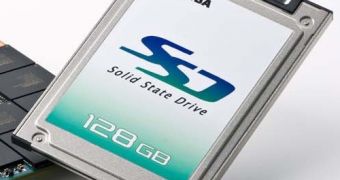Japanese conglomerate Toshiba announced that the company planned to deliver an affordable 512GB solid-state drive until 2009. According to the company, SSD shipments are expected to take off, as more than 25 percent of the shipped notebooks are alleged to come factory-equipped with the new medium.
At the moment, the company is working on a modest 128 GB drive that is slated for mass-availability in June, bundled with its DynaBook RX1 and Portege notebooks. The President of Toshiba Semiconductor Company, Shozo Saito, claims that the solid-state industry will surge 313 percent per year through 2011. The news was broken at an International Disk Drive Equipment and Materials Association (IDEMA) function in Japan.
Saito also claimed that the solid-state drive-equipped notebooks would not account for more than 10 percent until 2010, but things will change during 2011, when SSDs will be present in more than 25 percent of the mobile market.
The increased number of sold drives is expected to trigger dramatic price slashes and will pave the way to widespread adoption. In fact, the solid-state drive market will play by the same rules as the DRAM world.
Toshiba plans to boost its producing capacity and, at the same time, to reduce the manufacturing costs by switching to a miniature process. For instance, the company said that it has started its 43-nanometer process volume production in March 2008, and is currently researching on the 30-nanometer node, but it will not ramp up production until late 2009.
The Japanese conglomerate will address storage space issues as well. While the largest SSD capacity available now from Toshiba reaches 128 GB per drive, the upcoming offerings will reach 512 GB. Another critical aspect is the SSD lifespan, that is now limited to 10,000 read/write cycles for MLC (multi level cell) flash.
"If data is efficiently concentrated and stored in caches in an effort to reduce the frequency of rewrites, rewrites on SSDs can be reduced to a number far below 10,000 times in five years, even for heavy PC users," claimed Saito.

 14 DAY TRIAL //
14 DAY TRIAL //